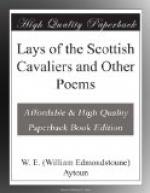This resolution was received by the army with marks of unequivocal vexation. Retreat, in their estimation, was little less than overthrow; and it was most galling to find that, after all their labours, hazards, and toils, they were doomed to disappointment at the very moment when the prize seemed ready for their grasp. That the movement was an injudicious one is, I think, obvious. We are told, upon good authority, “that the very boldness of the Prince’s onward movement, especially taken into connexion with the expected descent from France, had at length disposed the English Jacobites to come out; and many were just on the point of declaring themselves, and marching to join his army, when the retreat from Derby was determined on. A Mr. Barry arrived in Derby two days after the Prince left it, with a message from Sir Watkin William Wynne and Lord Barrymore, to assure him, in the names of many friends of the cause, that they were ready to join him in what manner he pleased, either in the capital, or every one to rise in his own county. I have likewise been assured that many of the Welsh gentry had actually left their homes, and were on the way to join Charles, when intelligence of his retreat at once sent them all back peaceably, convinced that it was now too late to contribute their assistance. These men, from the power they had over their tenantry, could have added materially to his military force. In fact, from all that appears, we must conclude that the insurgents had a very considerable chance of success from an onward movement—also, no doubt, a chance of destruction, and yet not worse than what ultimately befell many of them—while a retreat broke in a moment the spell which their gallantry had conjured up, and gave the enemy a great advantage over them.”
One victory more was accorded to Prince Charles, before his final overthrow. After successfully conducting his retreat to Scotland, occupying Glasgow, and strengthening his army by the accession of new recruits, he gave battle to the royal forces under General Hawley at Falkirk, and, as at Preston, drove them from the field. The parties were on this occasion fairly matched, there being about eight thousand men engaged on either side. The action was short; and, though not so decisive as the former one, gave great confidence to the insurgents. It has been thus picturesquely portrayed by the historian of the enterprise: “Some individuals, who beheld the battle from the steeple of Falkirk, used to describe these, its main events, as occupying a surprisingly brief space of time. They first saw the English army enter the misty and storm-covered muir at the top of the hill; then saw the dull atmosphere thickened by a fast-rolling smoke, and heard the pealing sounds of the discharge; immediately after, they beheld the discomfited troops burst wildly from the cloud in which they had been involved, and rush, in far-spread disorder, over the face of the hill. From the commencement of what they styled ‘the break of the battle,’ there did not intervene more than ten minutes—so soon may an efficient body of men become, by one transient emotion of cowardice, a feeble and contemptible rabble.




